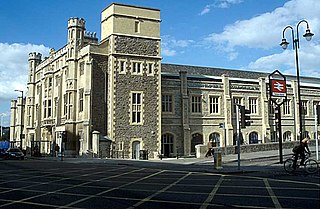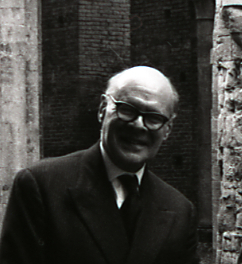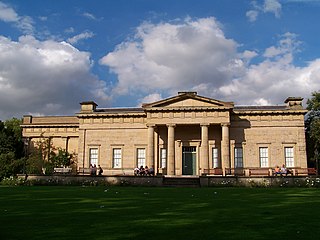The Melbourne Museum is a natural and cultural history museum located in the Carlton Gardens in Melbourne, Australia.

Soho House is a museum run by Birmingham Museums Trust, celebrating Matthew Boulton's life, his partnership with James Watt, his membership of the Lunar Society of Birmingham and his contribution to the Midlands Enlightenment and the Industrial Revolution. It is a Grade II* listed 18th-century house in Handsworth, part of Birmingham since 1911, but historically in the county of Staffordshire. It was the home of entrepreneur Matthew Boulton from 1766 until his death in 1809, and a regular meeting-place of the Lunar Society.

Birmingham Museum and Art Gallery (BM&AG) is a museum and art gallery in Birmingham, England. It has a collection of international importance covering fine art, ceramics, metalwork, jewellery, natural history, archaeology, ethnography, local history and industrial history.

Millennium Point is a multi-use meeting and conference venue, public building and charitable trust in Birmingham, England, situated in the developing Eastside of the city centre. The complex contains multiple event spaces, including a 354-seat auditorium, formerly Giant Screen IMAX cinema; Birmingham Science Museum, Royal Birmingham Conservatoire's School of Acting and Birmingham City University's Faculty of Computing, Engineering and The Built Environment, part of Birmingham Metropolitan College.

Thinktank, Birmingham is a science museum in Birmingham, England. Opened in 2001, it is part of Birmingham Museums Trust and is located within the Millennium Point complex on Curzon Street, Digbeth.

The Ikon Gallery is an English gallery of contemporary art, located in Brindleyplace, Birmingham. It is housed in the Grade II listed, neo-gothic former Oozells Street Board School, designed by John Henry Chamberlain in 1877.

The British Empire and Commonwealth Museum was a museum in Bristol, England, exploring the history of the British Empire and the effect of British colonial rule on the rest of the world. The museum opened in 2002 and entered voluntary liquidation in 2013.

Sir John Denis Mahon, was a British collector and historian of Italian art. Considered to be one of the few art collectors who was also a respected scholar, he is generally credited, alongside Sacheverell Sitwell and Tancred Borenius, with bringing Italian pre-Baroque and Baroque painters to the attention of English-speaking audiences, reversing the critical aversion to their work that had prevailed from the time of John Ruskin.

Leeds City Museum, originally established in 1819, reopened in 2008 in Leeds, West Yorkshire, England. It is housed in the former Mechanics' Institute built by Cuthbert Brodrick, in Cookridge Street. It is one of nine sites in the Leeds Museums & Galleries group.

York Art Gallery is a public art gallery in York, England, with a collection of paintings from 14th-century to contemporary, prints, watercolours, drawings, and ceramics. It closed for major redevelopment in 2013, reopening in summer of 2015. The building is a Grade II listed building and is managed by York Museums Trust.

The Bronx Museum of the Arts (BxMA), also called the Bronx Museum of Art or simply the Bronx Museum, is an American cultural institution located in Concourse, Bronx, New York. The museum focuses on contemporary and 20th-century works created by American artists, but it has hosted exhibitions of art and design from Latin America, Africa, and Asia. Its permanent collection consists of more than 800 paintings, sculptures, photographs, and works on paper. The museum is part of the Grand Concourse Historic District.

The Archives of American Art is the largest collection of primary resources documenting the history of the visual arts in the United States. More than 20 million items of original material are housed in the Archives' research centers in Washington, D.C., and New York City.
Sir Paul Martin Ruddock, is a British businessman, philanthropist and patron of the arts. He is a co-founder and a former CEO of Lansdowne Partners. In addition he is a former Chairman of the Victoria & Albert Museum and Chairman of the University of Oxford Endowment.
Ann Sumner is an art historian, exhibition curator, author and former museum director. She is currently Visiting Professor at Manchester Metropolitan University and Chair of the Methodist Modern Art Collection.

York Museums Trust (YMT) is the charity responsible for operating some key museums and galleries in York, England. The trust was founded in 2002 to run York's museums on behalf of the City of York Council. It has seen an increase in annual footfall of 254,000 to the venues since its foundation. In both 2016 and 2017, it saw its annual visitors numbers reach 500,000 people.

Birmingham, Its people, Its History is a permanent exhibition at Birmingham Museum and Art Gallery and is also unofficially known as the Birmingham History Galleries. It opened to the public in October 2012 and is located on the third floor of the museum covering an area of 1,040 square metres. The exhibition is divided into five galleries which explore the story of Birmingham, England, and its people over a period of 900 years, from the 12th century to the present day. Over 1,500 objects are displayed from the museum’s designated collections, many of which can be seen on the museum's Flickr account. The £8.9m capital development was principally funded by the Heritage Lottery Fund, but other funders also include Arts Council England, The Wolfson Foundation and Birmingham City Council. The galleries were designed by Redman Design of Ilkley, Yorkshire, in collaboration with the curatorial department at Birmingham Museum and Art Gallery.
Maria Jane Balshaw CBE is director of the Tate art museums and galleries. The appointment was confirmed by Theresa May, the UK Prime Minister at the time, on 16 January 2017, making Balshaw the first female director of the Tate.
Reyahn King is a British curator and museum director. She is the chief executive officer of York Museums Trust.

Museum of Freemasonry, based at Freemasons’ Hall, London, is a fully accredited museum since 2009, with a designated outstanding collection of national importance since 2007 and registered charitable trust since 1996. The facility encompasses a museum, library, and archive.






















